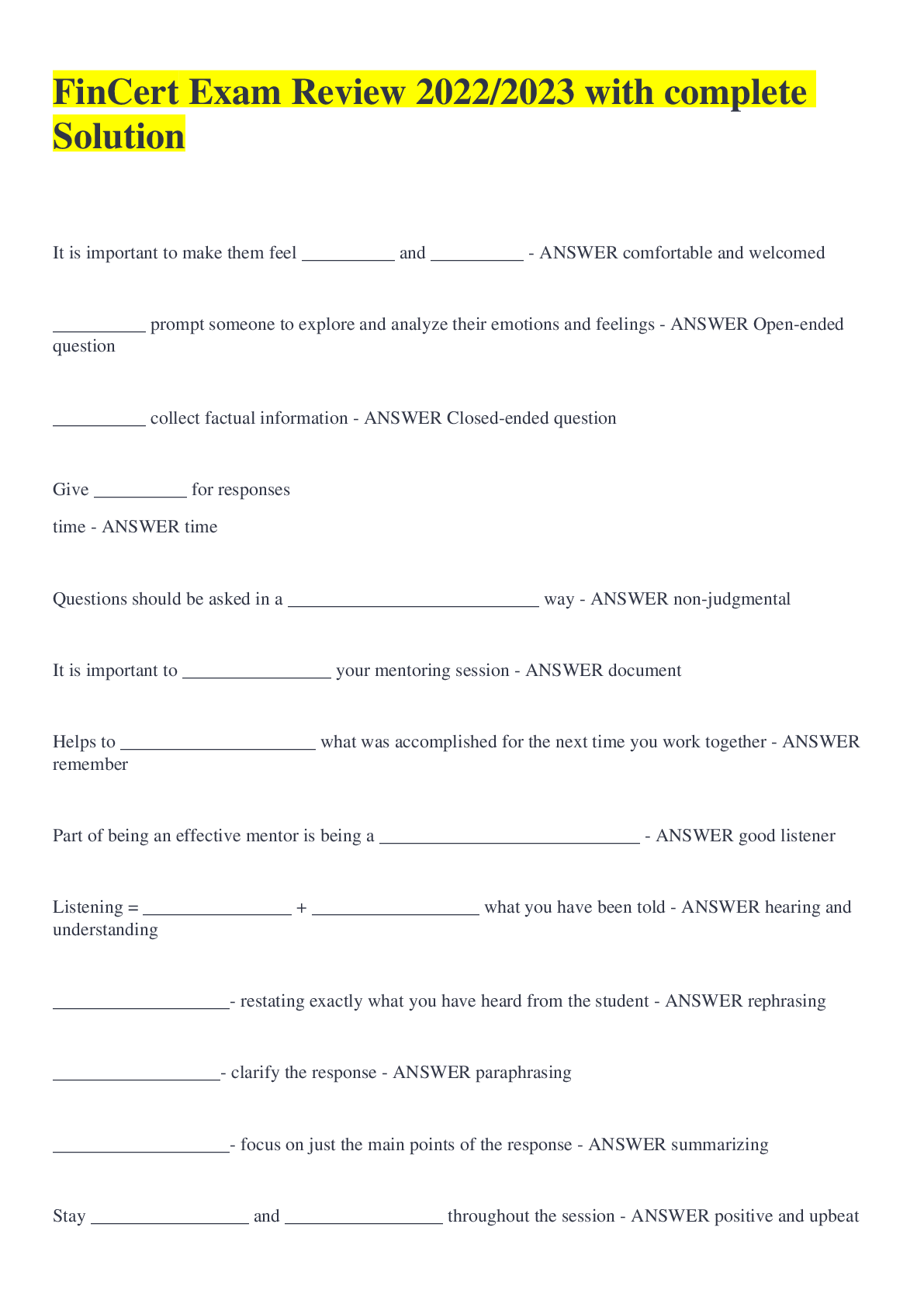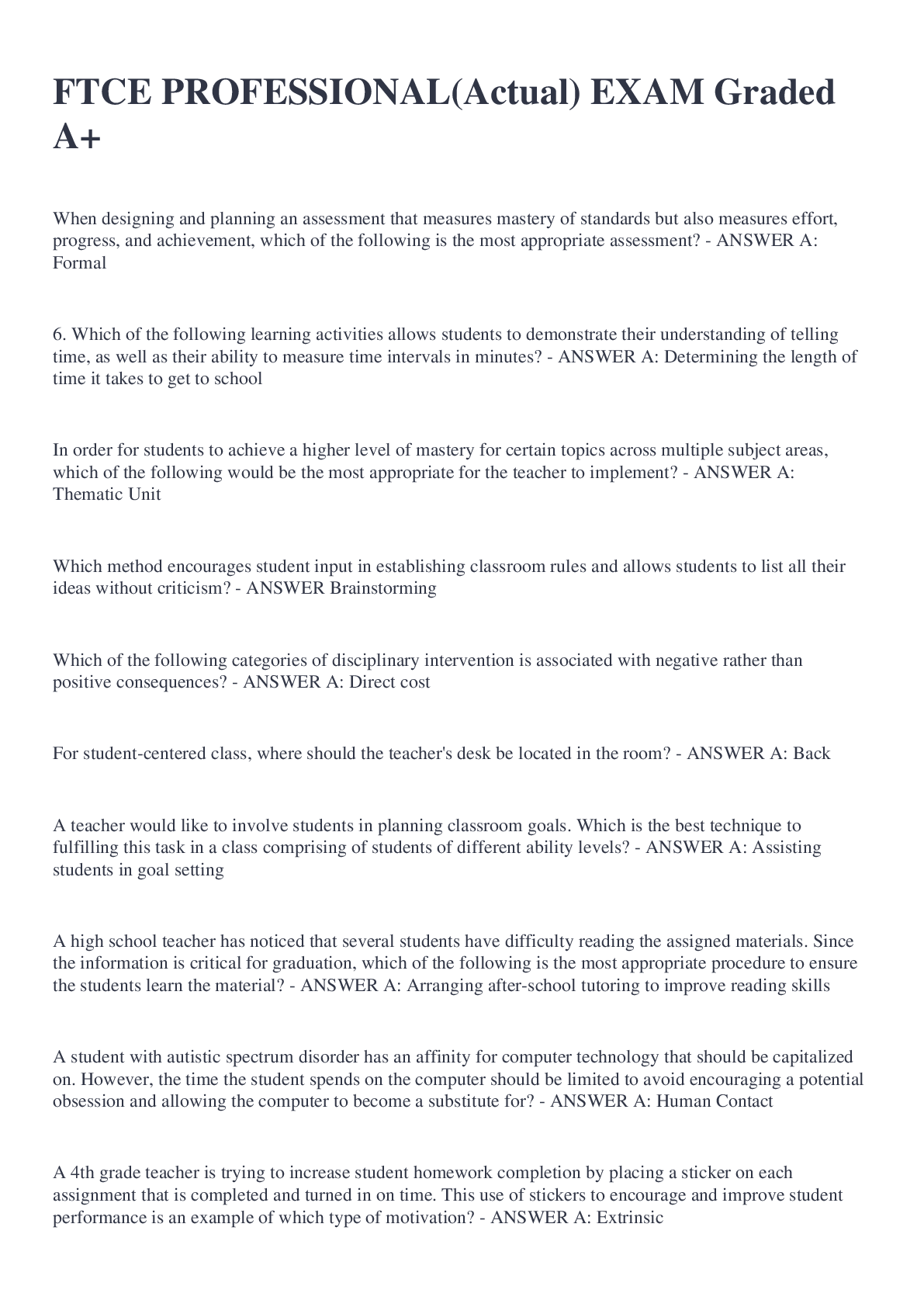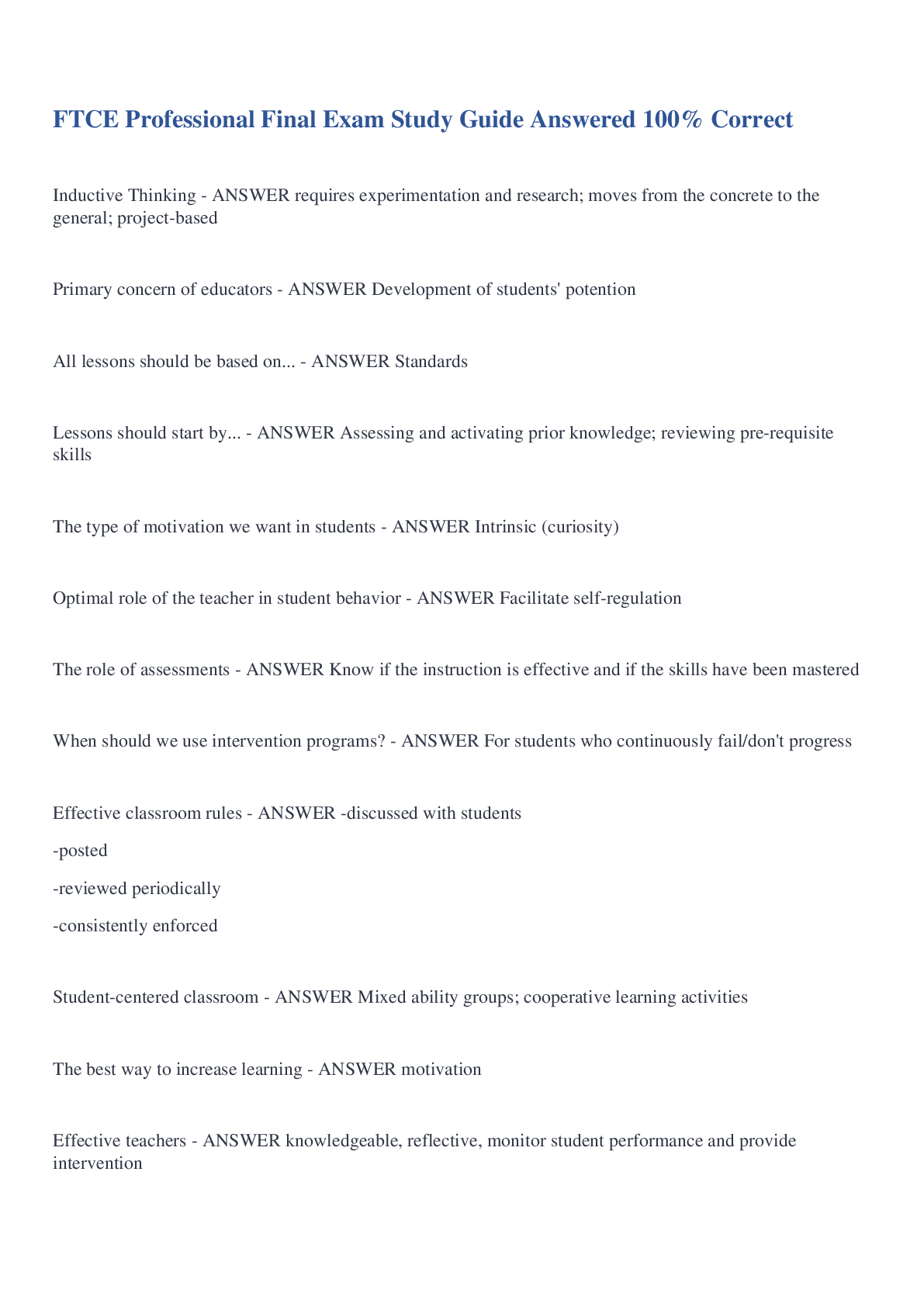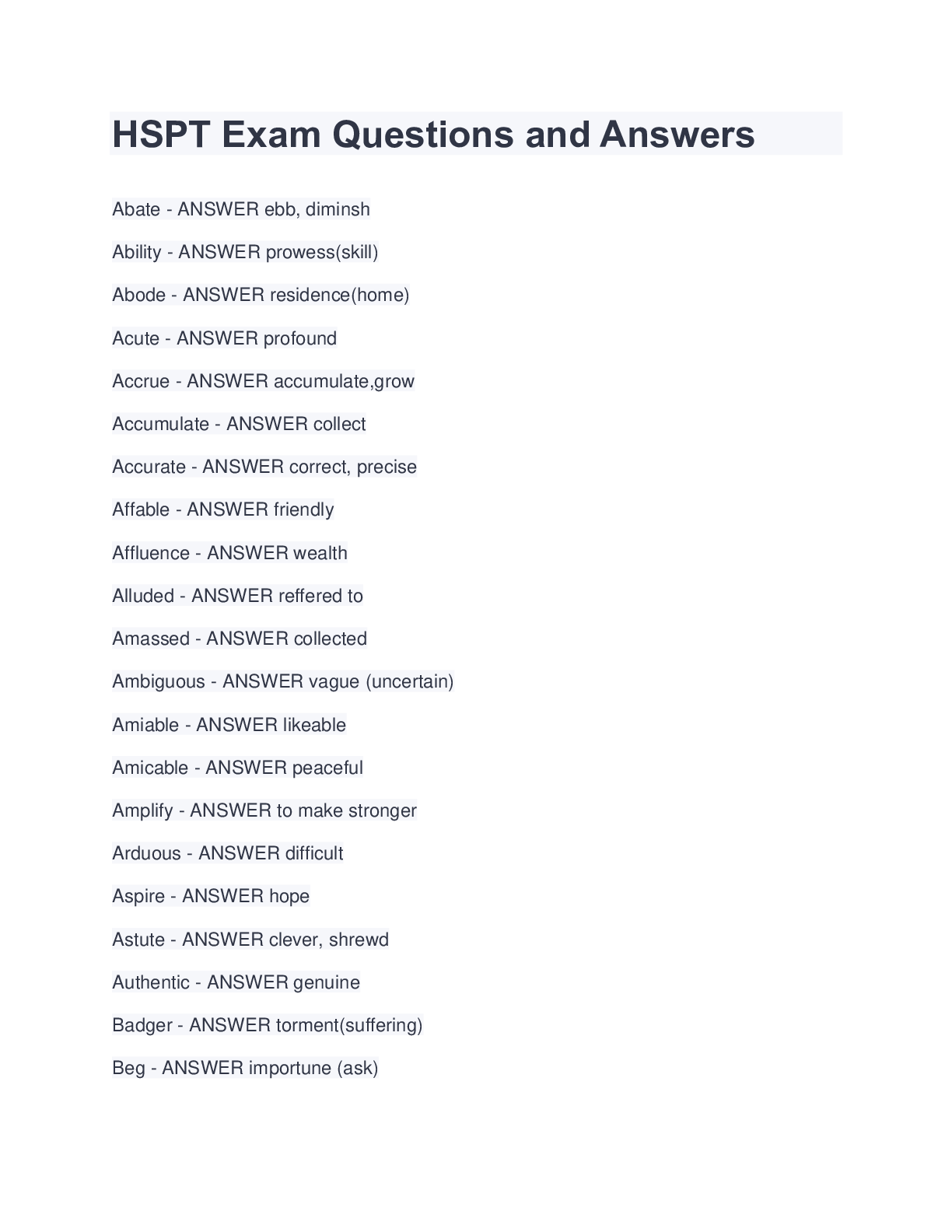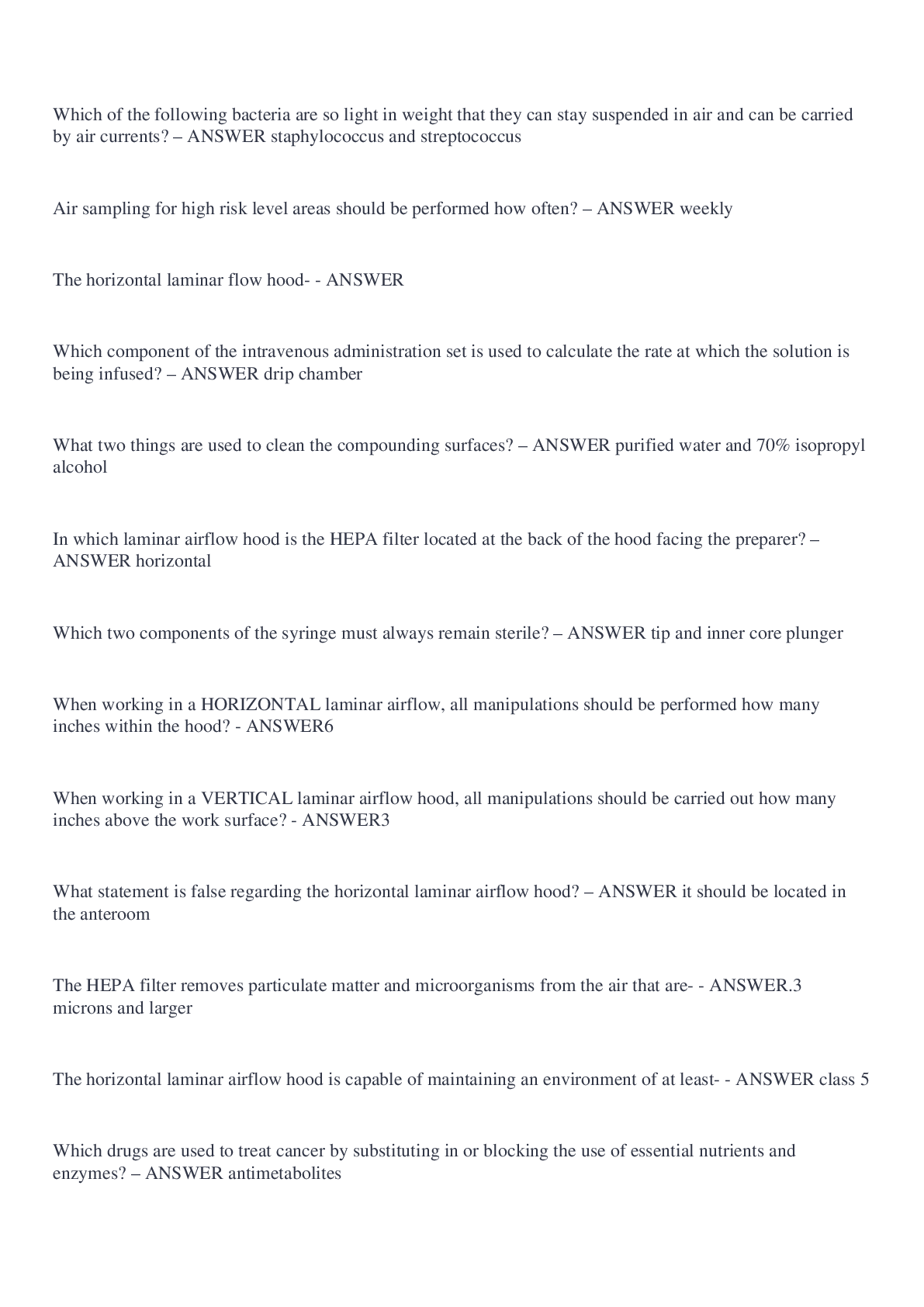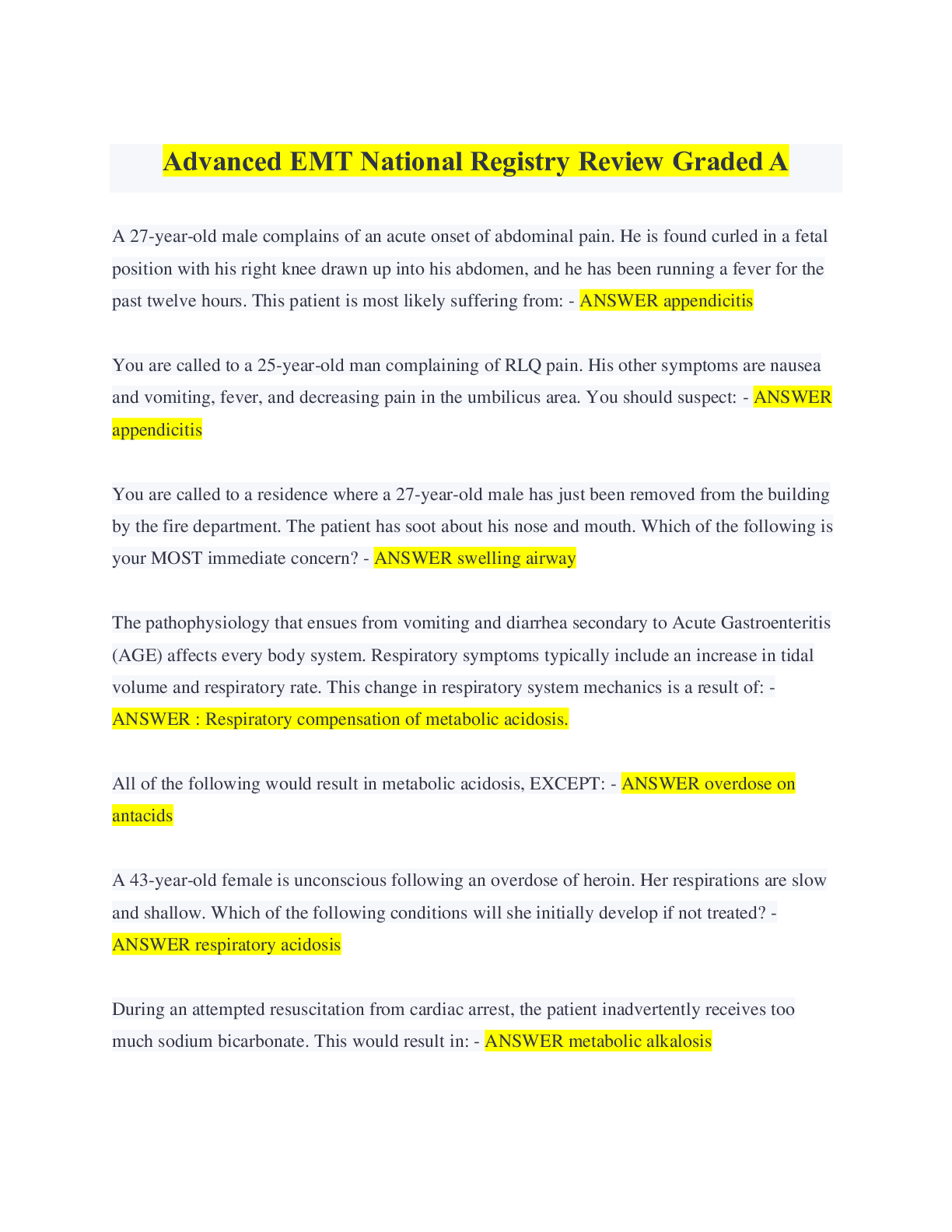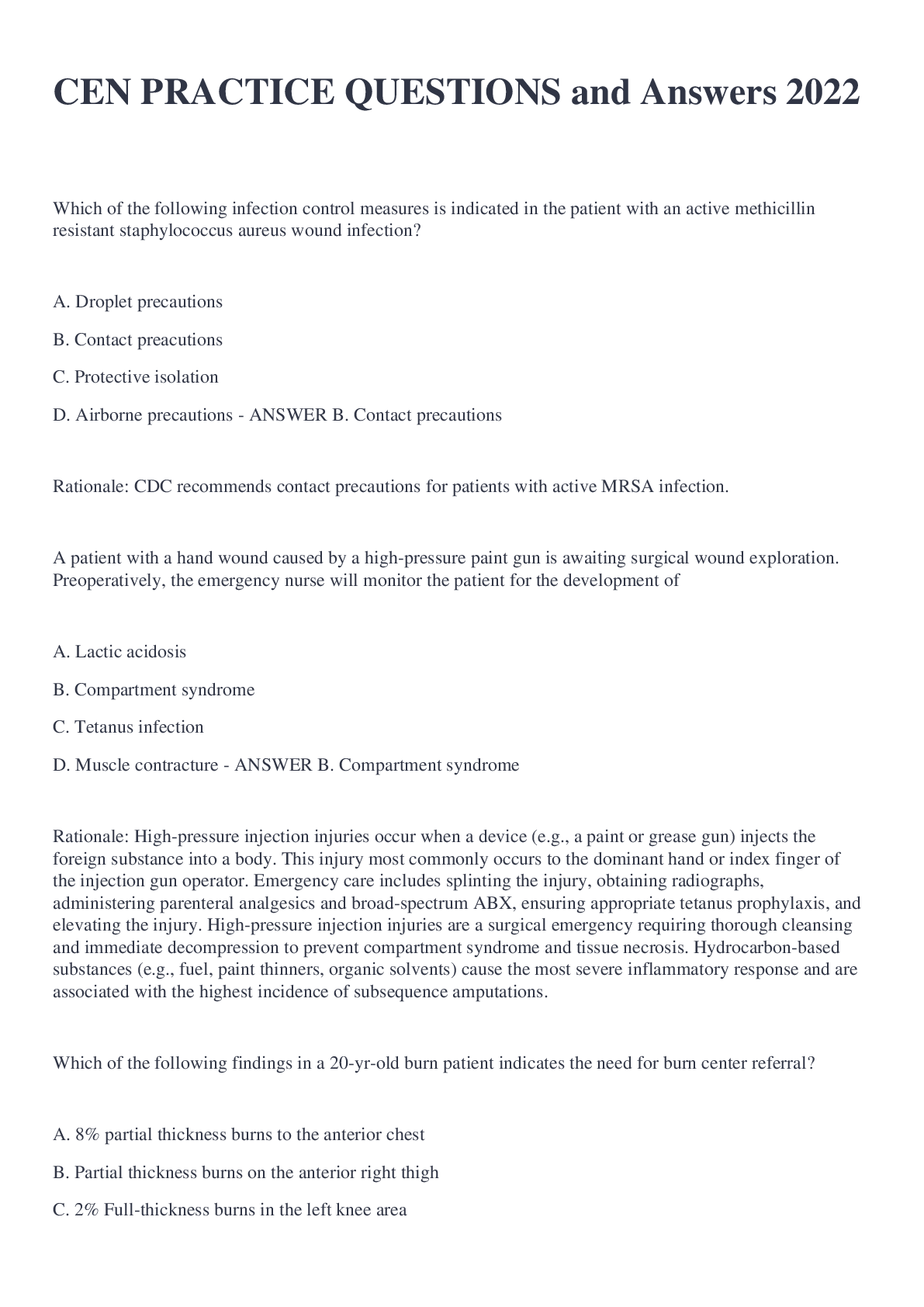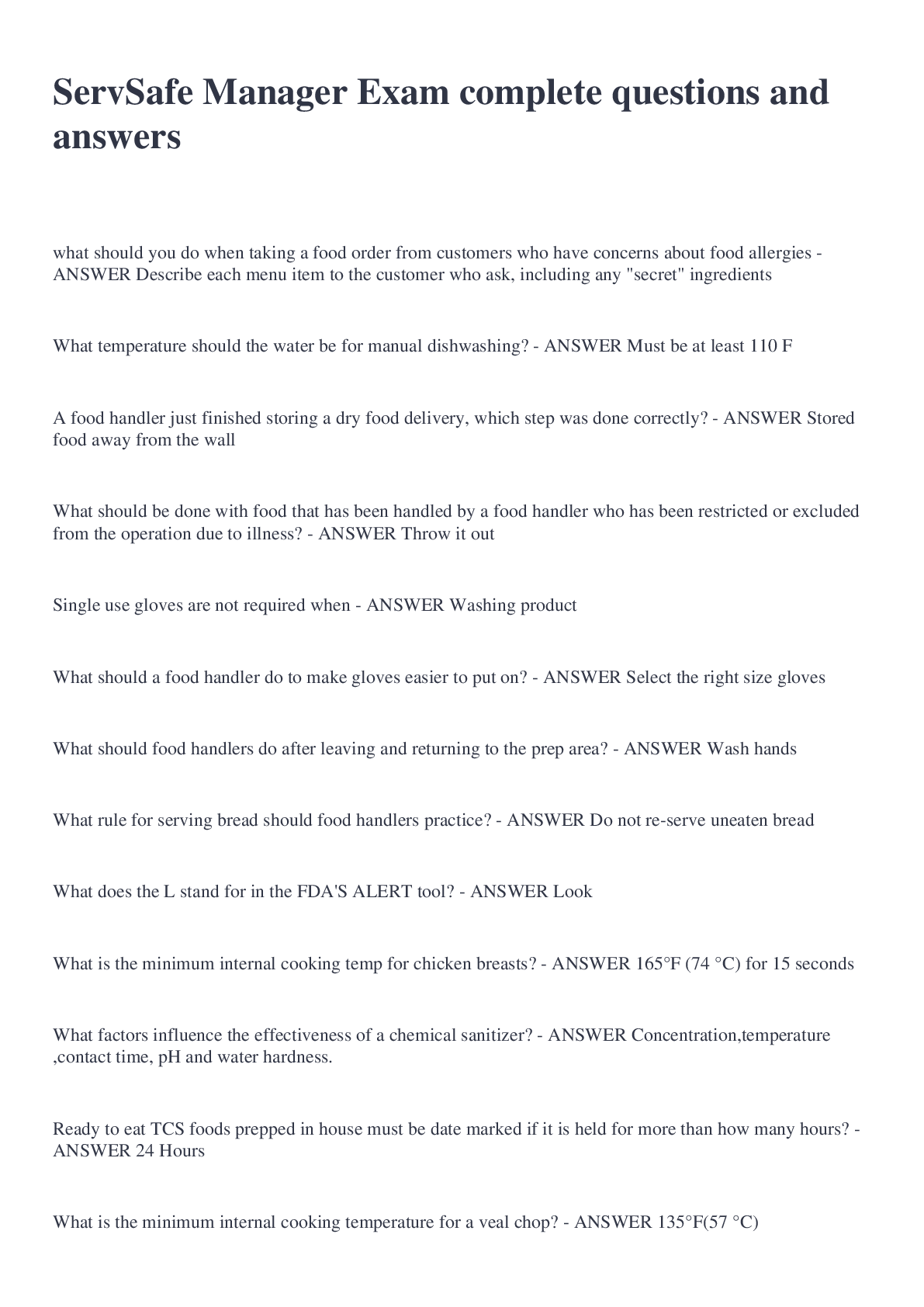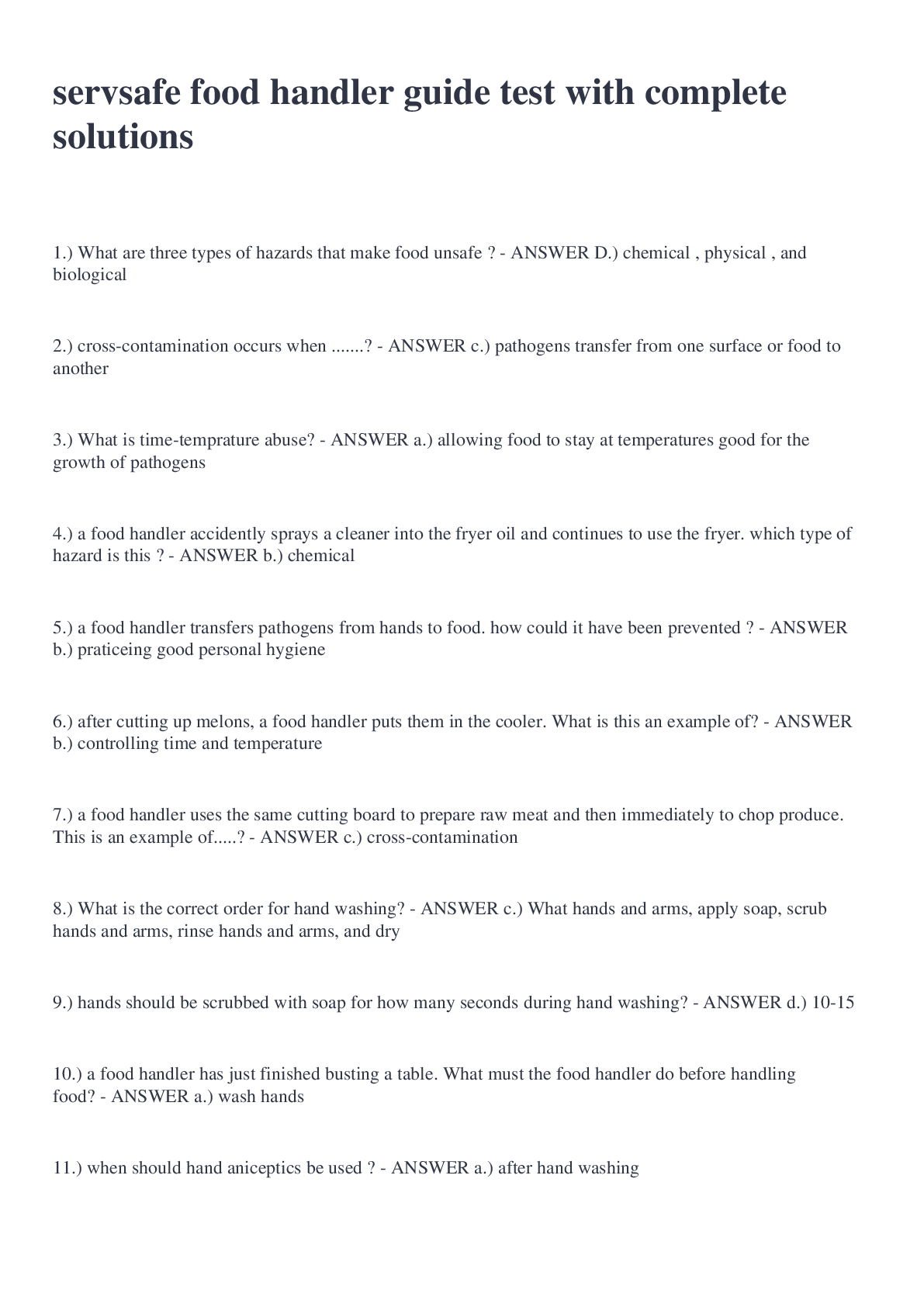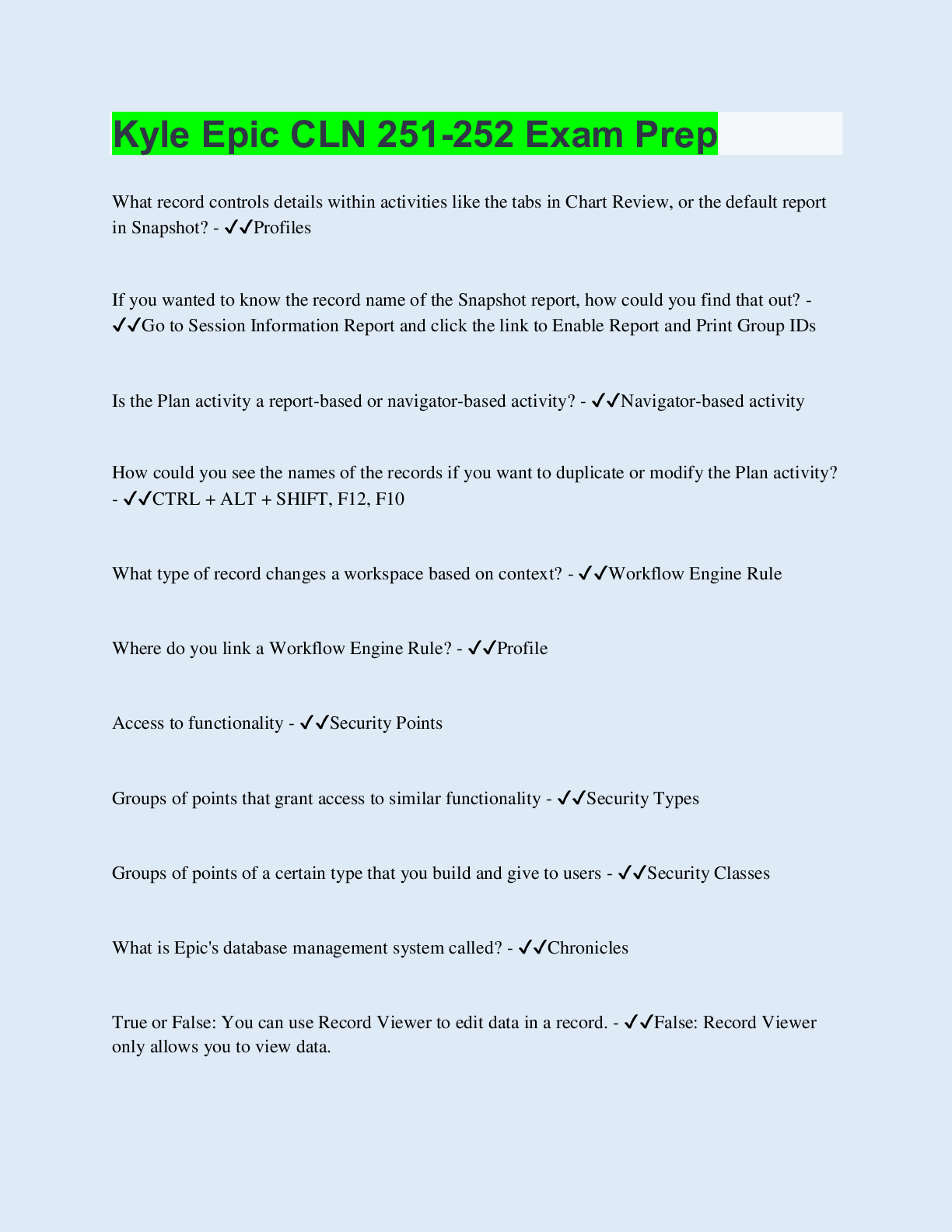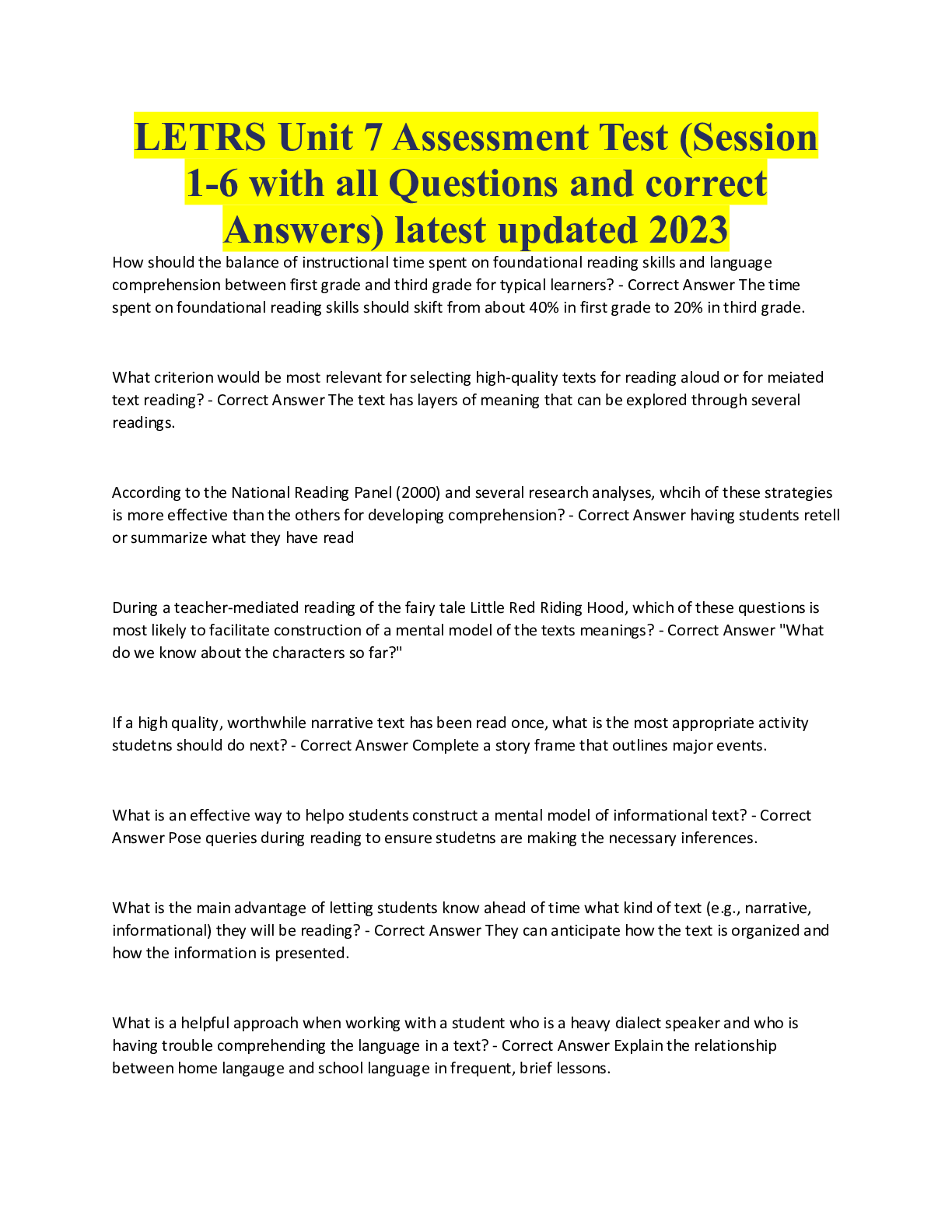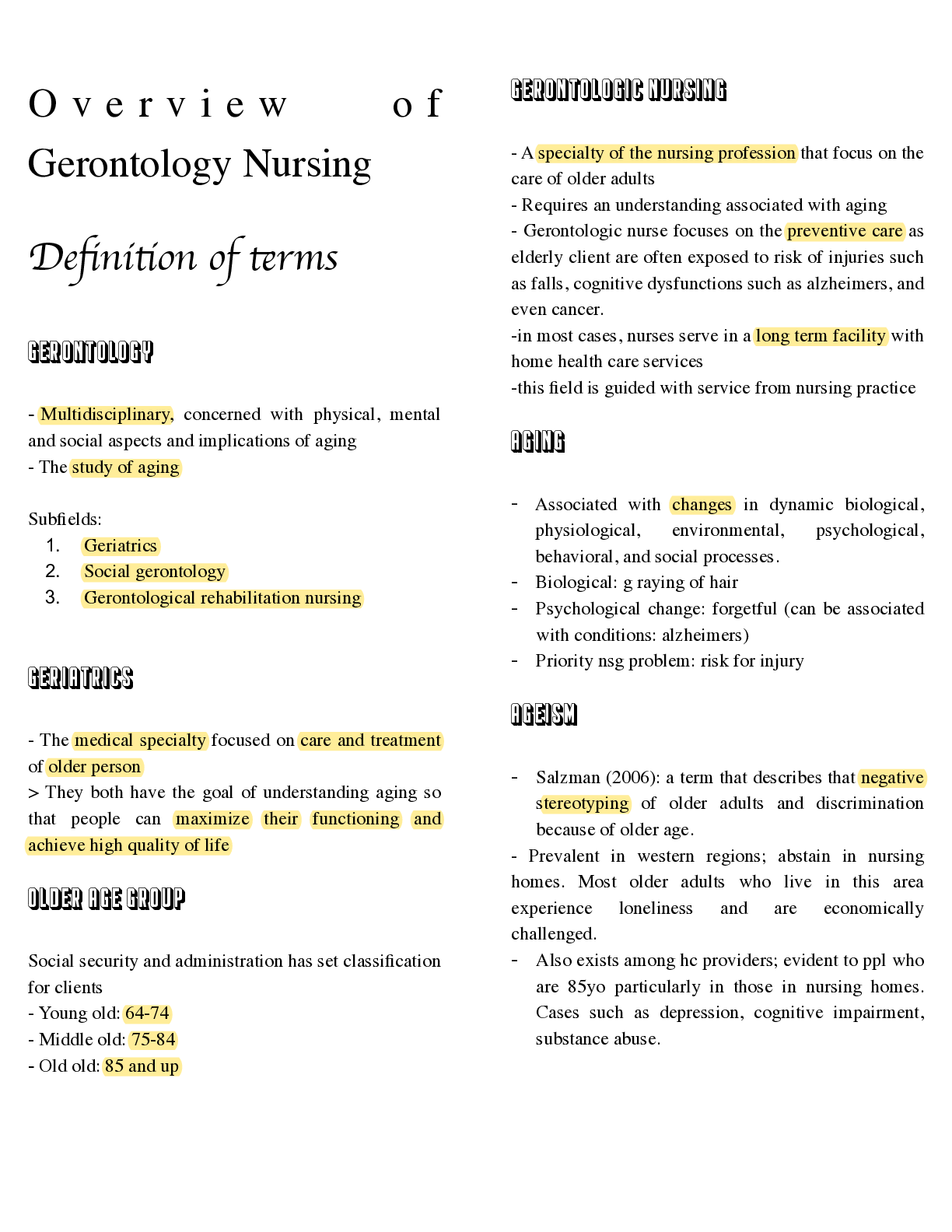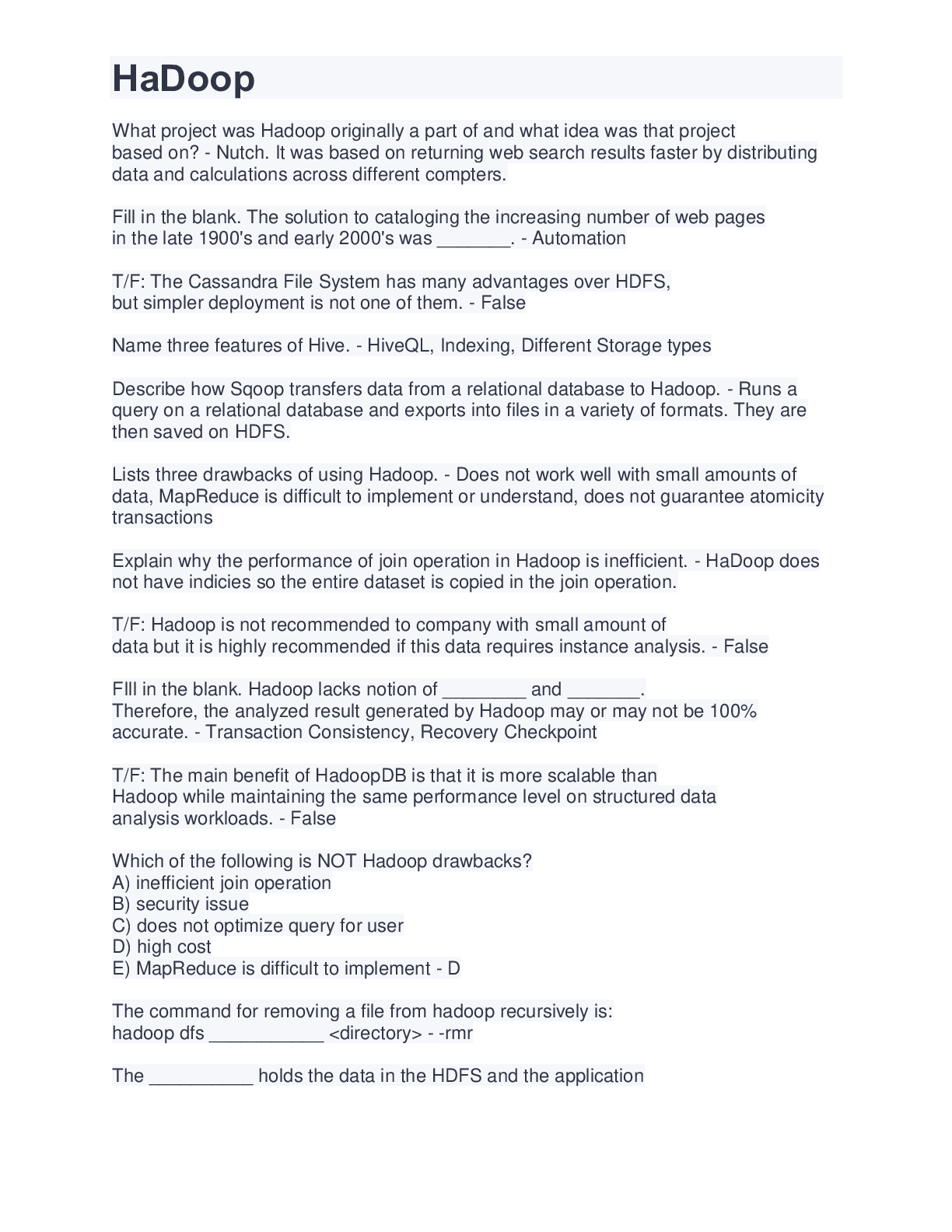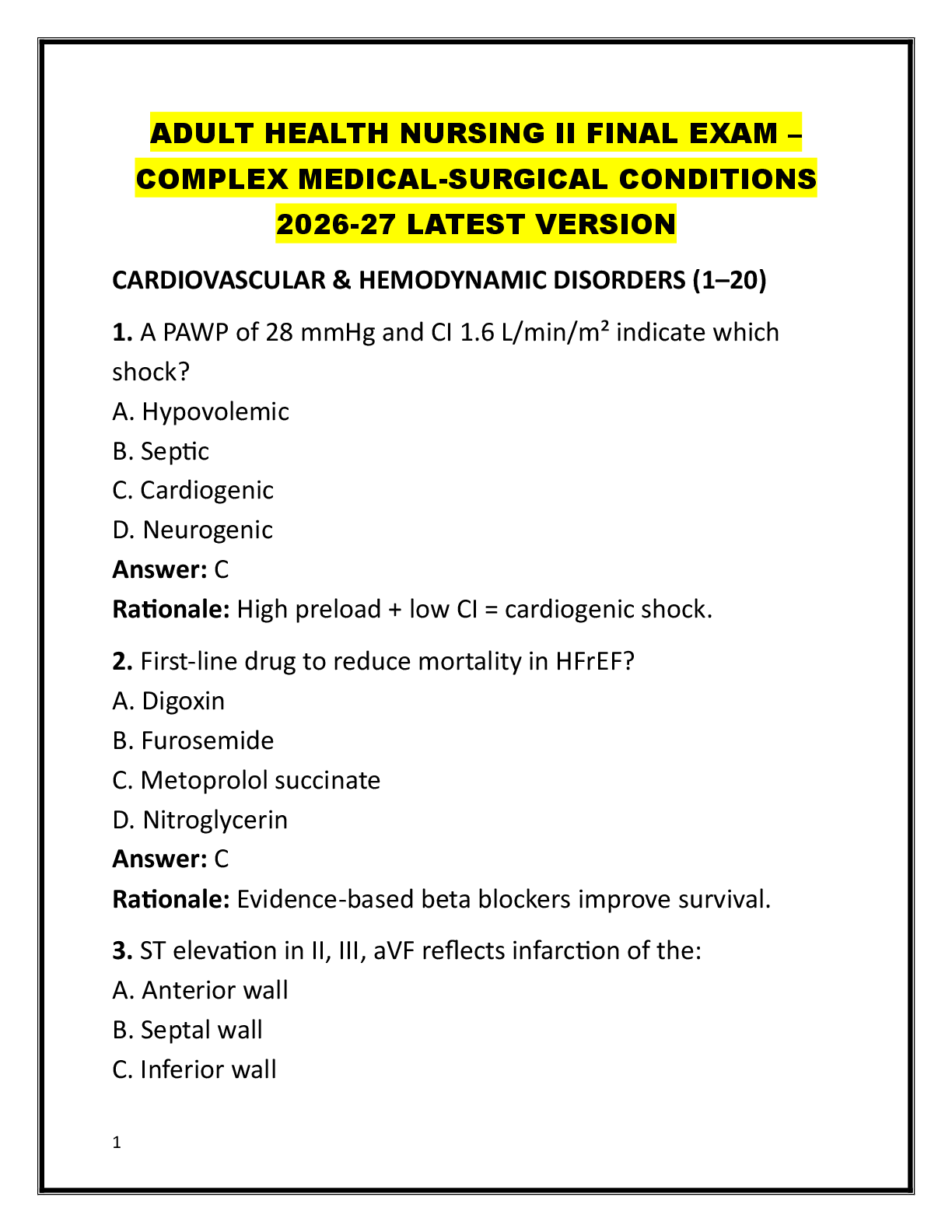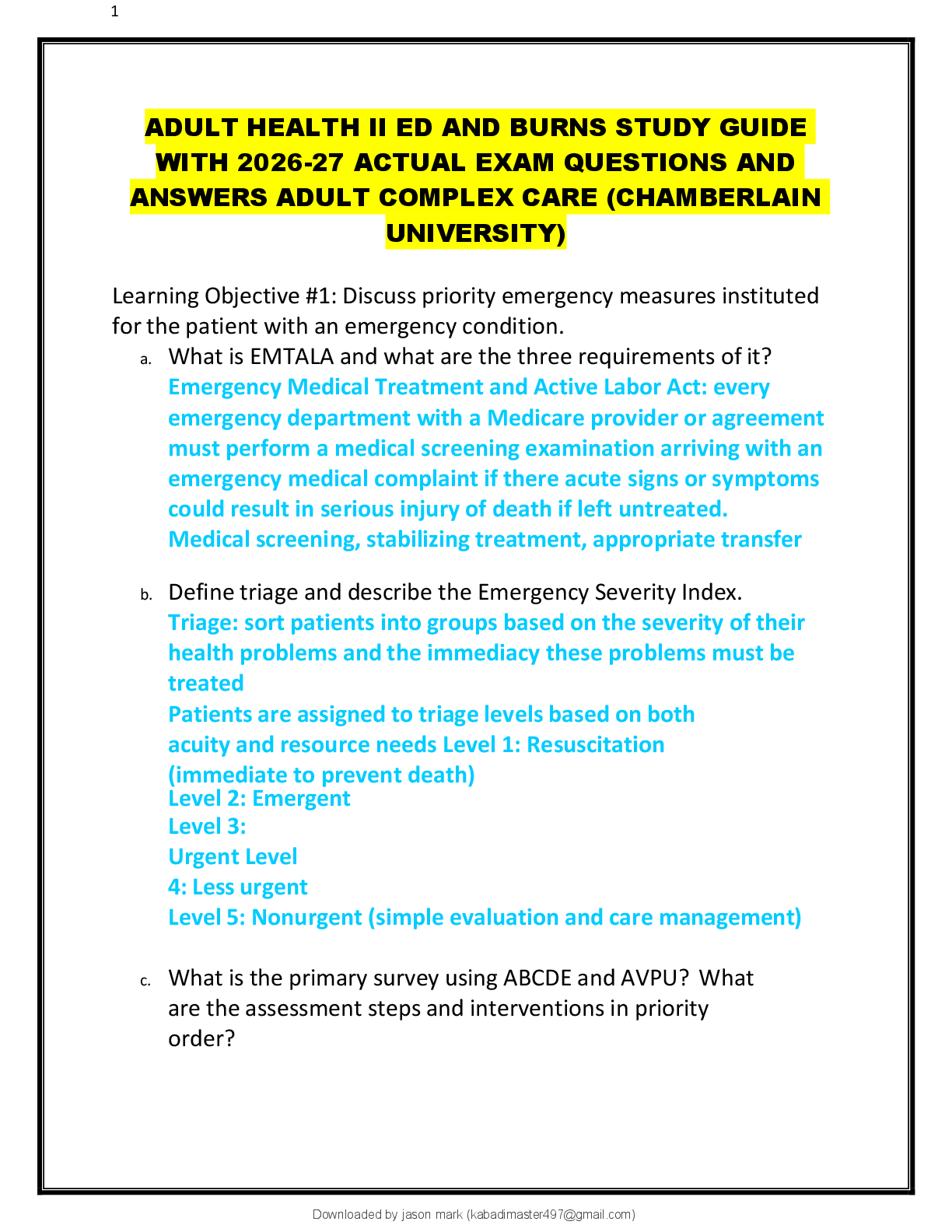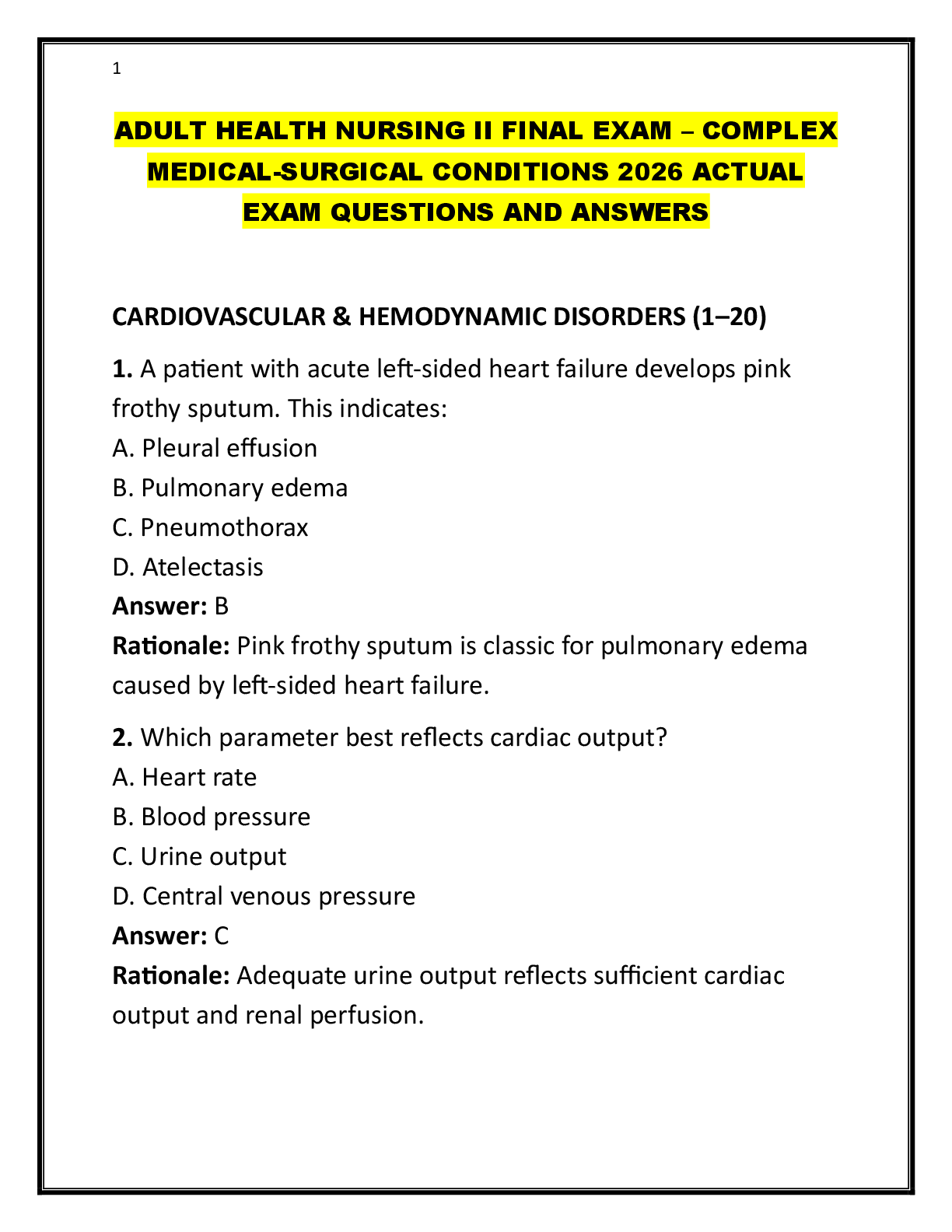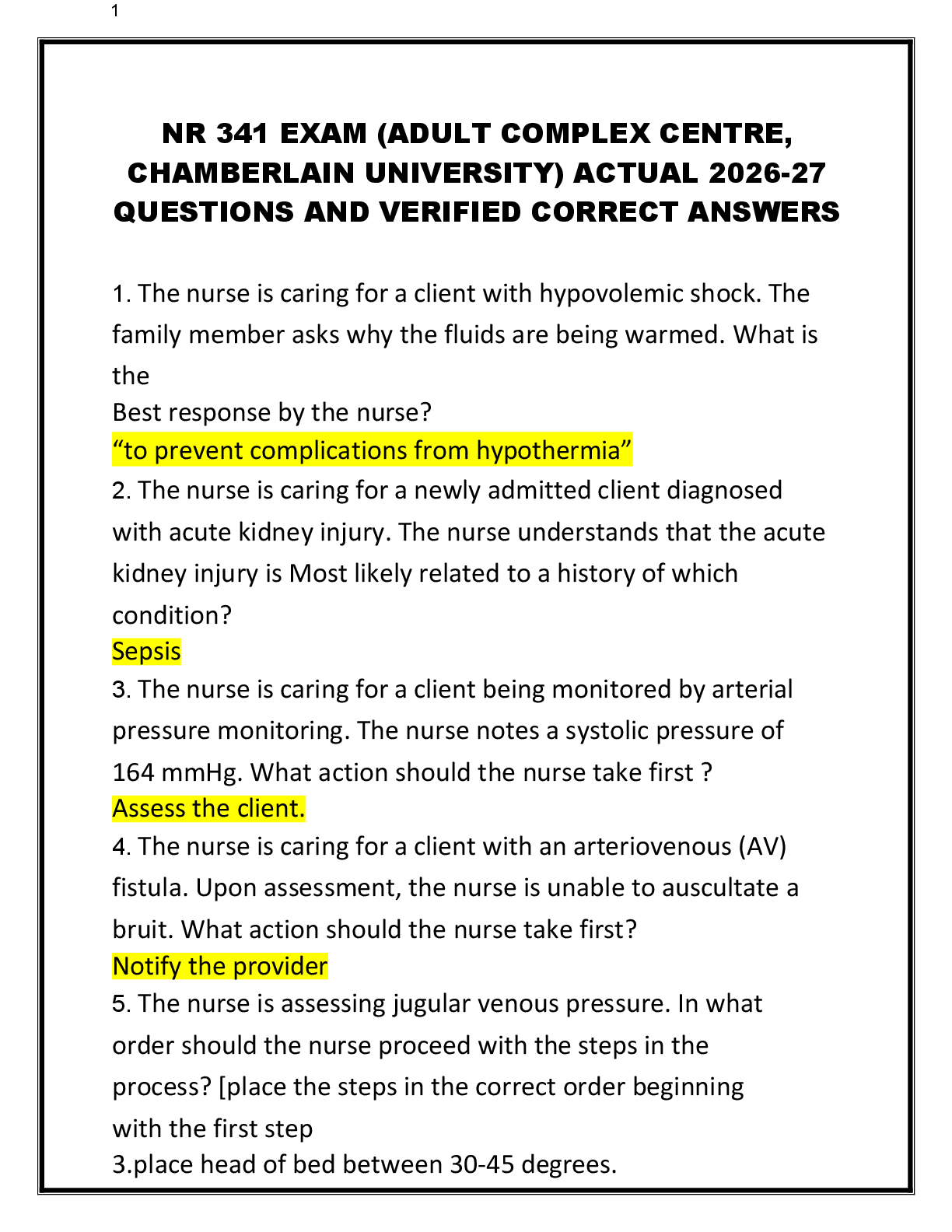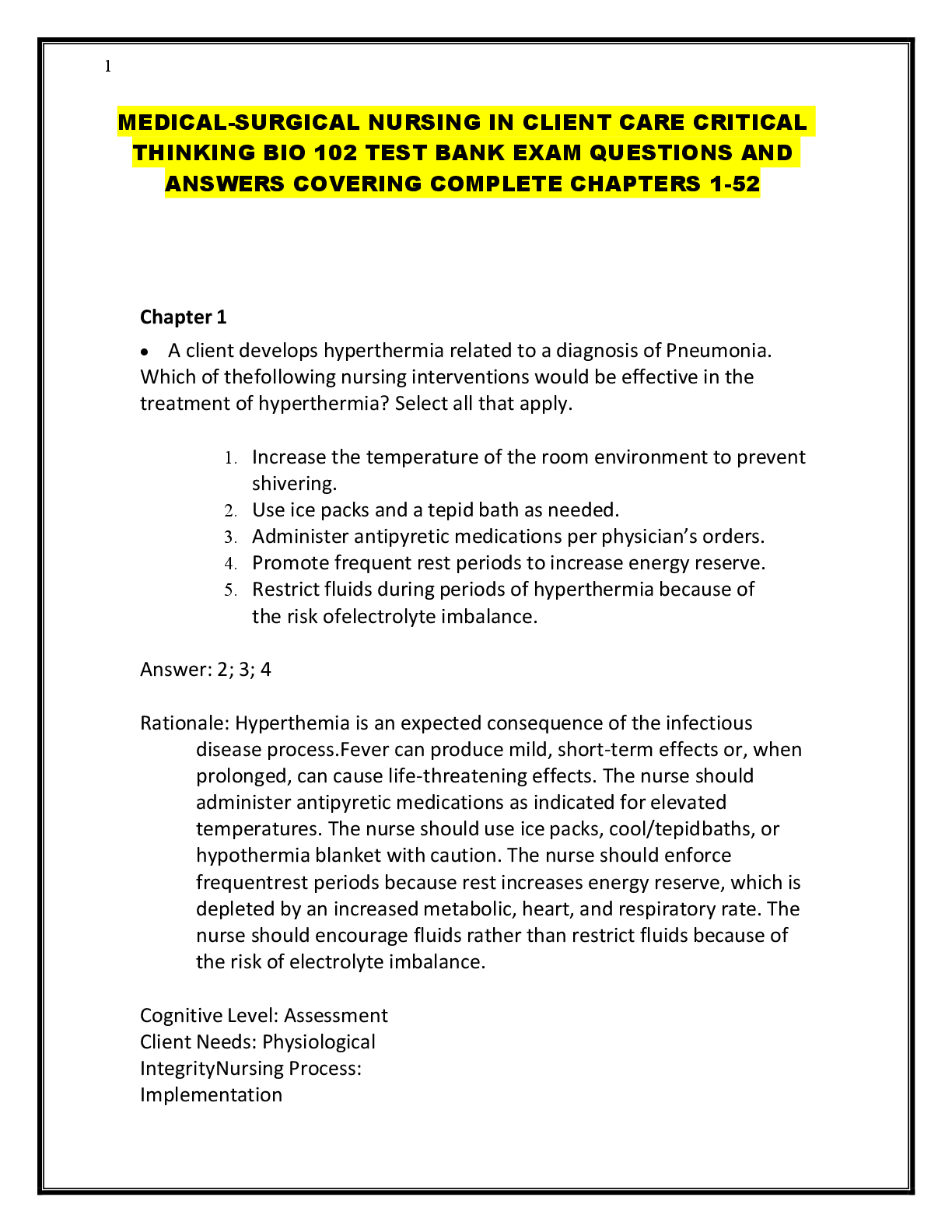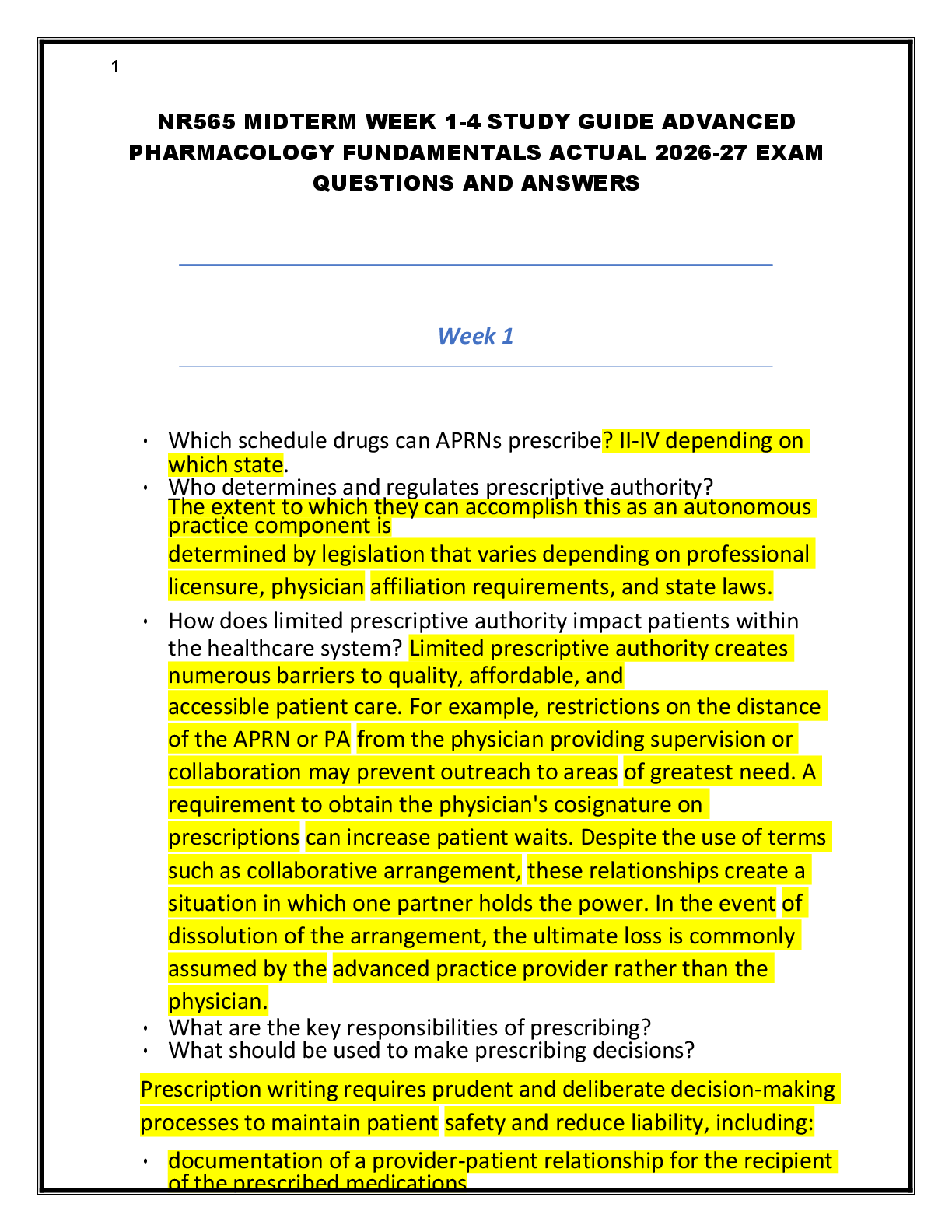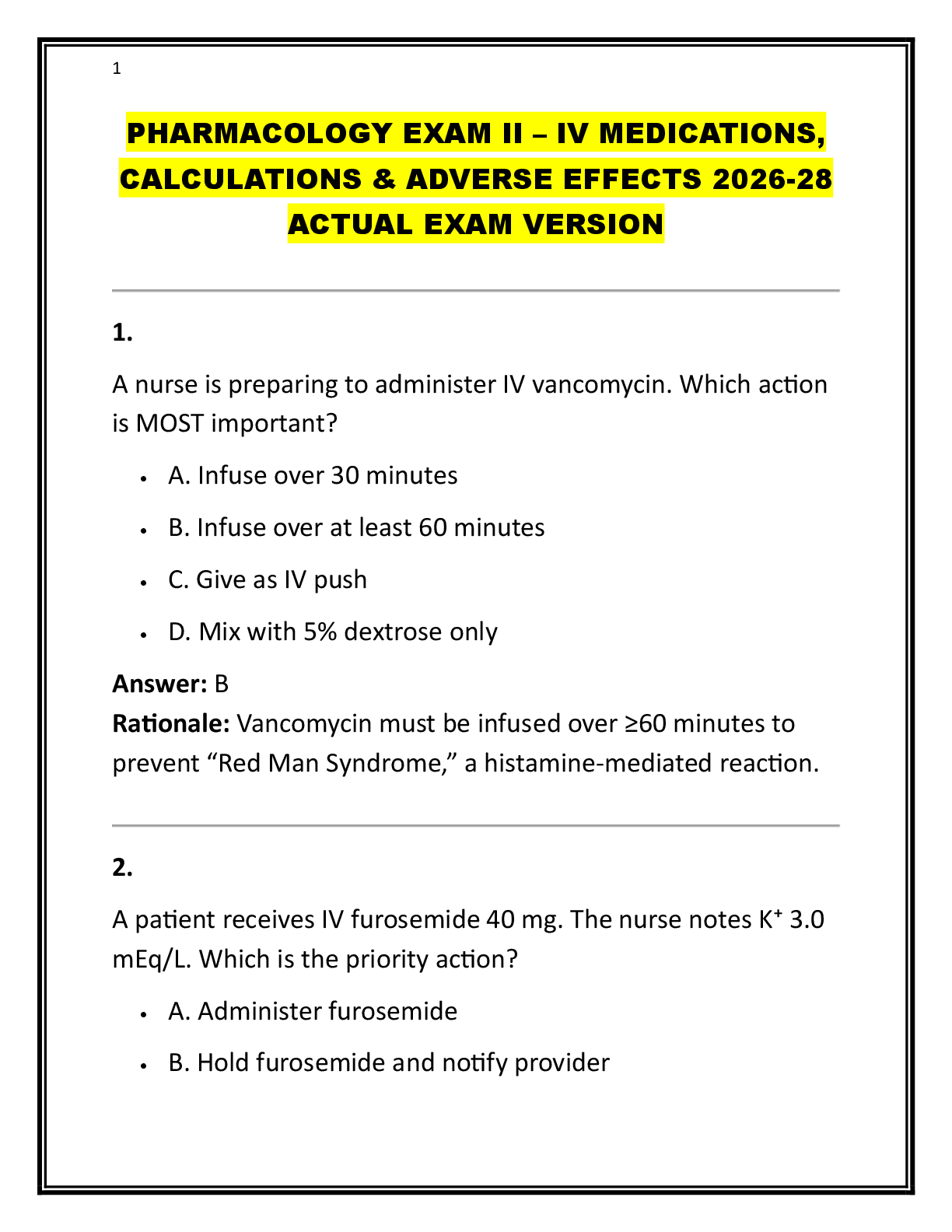It is important to make them feel __________ and __________ - ANSWER comfortable and welcomed
__________ prompt someone to explore and analyze their emotions and feelings - ANSWER Open-ended question
__________ col
...
It is important to make them feel __________ and __________ - ANSWER comfortable and welcomed
__________ prompt someone to explore and analyze their emotions and feelings - ANSWER Open-ended question
__________ collect factual information - ANSWER Closed-ended question
Give __________ for responses
time - ANSWER time
Questions should be asked in a ___________________________ way - ANSWER non-judgmental
It is important to ________________ your mentoring session - ANSWER document
Helps to _____________________ what was accomplished for the next time you work together - ANSWER remember
Part of being an effective mentor is being a ____________________________ - ANSWER good listener
Listening = ________________ + __________________ what you have been told - ANSWER hearing and understanding
___________________- restating exactly what you have heard from the student - ANSWER rephrasing
__________________- clarify the response - ANSWER paraphrasing
___________________- focus on just the main points of the response - ANSWER summarizing
Stay _________________ and _________________ throughout the session - ANSWER positive and upbeat
____________________ the student to take the next steps you discuss together - ANSWER encourage
Every mentoring session should end on a __________________ note - ANSWER positive
Give the student a printed action plan with: ___________________ and ___________________ - ANSWER campus resources and your contact information (if appropriate)
________________- vocal communication, language - ANSWER verbal
________________- wordless cues (tone of voice, loudness, inflection, pitch, body language, gestures, posture, etc.) - ANSWER non-verbal
What form of communication is more subtle and harder to pick up on? - ANSWER non-verbal communication
Intuitor Communicators - ANSWER Intuitor Communicators are big picture individuals who are inspirational, visionary and conceptual. They prefer to exist in the world of theories and possibilities and gain more satisfaction from planning, strategizing than from actual implementation. These individuals are creative problem solvers and inspire others to think outside of the box. Intuitors communicate concepts and insights but may not always have factual basis or understand how their ideas will actually work. Because they focus on possibilities, they move quickly from topic to topic. They often assume others understand their ideas without full explanation or that they think the same as they do. They are very convinced of the value of their ideas and contributions and may become irritated or defensive when others challenge their conclusions. This style is frequently criticized for being unrealistic and impractical.
Thinker Communicators - ANSWER Thinker Communicators are individuals that value logic, objectivity and analysis. They are not easily influenced by emotions and often believe emotions really have no place in decision making. These individuals prefer to analyze data or historical information when developing current solutions. Thinkers are even tempered and tend to treat others fairly. Thinkers communicate directly and are concerned more with honesty and accuracy. This tendency can be perceived as blunt and insensitive, and frequently inhibits building and nurturing relationships. Because thinkers are logical and factual, they assume everyone understands them and sees things the same way they do. This style is often criticized for being too cautious and conservative.
Senser Communicators - ANSWER [PA1]Senser Communicators are individuals who are results oriented and value deadlines and projects. This style has a high need to achieve but also they are very practical. These individuals will only commit themselves to a project or an idea once they know all the details and they have determined there is a high likelihood of success. Sensers tend to be more down-to-earth, energetic and are detail-oriented individuals. Though they can conceptualize, they prefer specifics. These individuals have high standards and are frequently perfectionists and expect that of others. They are very direct in their communication, with little patience for people who do not get to the point and they have no patience for small talk. Because Sensers are so focused on achievement, they may emphasize short term results over long term planning. This style is criticized for being too opinionated and not respecting others' opinions
Feeler Communicators - ANSWER Feeler Communicators are individuals who value their relationships with others. They respond to other people's needs, their feelings and moods. Feelers are quick to provide support, empathy and encouragement. A Feeler will typically be the person making sure that everyone else feels valued, that others gets their opinion heard and are happy. These individuals are good at facilitating consensus and mediating disagreement. They are great listeners, approachable and good at pointing out others' strengths. Because relationships are so important to a Feeler, goals and deadlines are sometimes sacrificed for the sake of the relationship. Their communication style tends to be more tactful than honest, as they do not want to hurt anyone's feelings. They may tend to avoid or delay making decisions until everyone is happy with the decision. Since Feelers rely more on "gut feelings" than logic, they may become defensive when confronted, appearing overly sensitive and subjective. This style can be criticized for being too emotional.
Give them the impression that you're interested in talking to ____________ - ANSWER them
Ask ____________________ about the student and their interests - ANSWER open-ended questions
Notice their ____________________ and ___________________ - ANSWER body language and feelings
Listen __________________ to what they are saying - ANSWER attentively
Look them directly in the ________________ - ANSWER eyes
Say the person's _________________ - ANSWER name
VARK Model based on the model by ___________________ - ANSWER Neil Fleming
V: ________________________- examples of ways to best learn - ANSWER Visual learners
EX)Pictures, movies, diagrams, etc.
A: ________________________- examples of ways to best learn - ANSWER Auditory learners
EX)Music, discussion, lectures, etc.
R: ________________________- examples of ways to best learn - ANSWER Reading and Writing learners
EX)Making lists, reading textbooks, taking notes, etc.
K: ________________________- examples of ways to best learn - ANSWER Kinesthetic learners
EX)Movement, experiments, hands-on activities, etc.
____________ or ____________ get into a nonprofessional relationship with students - ANSWER Should or should not
Be _______________________ of information being shared, tell them if any information must be shared with another person - ANSWER respectful
Confidentiality belongs to _______ ____________ and it is for them to waive, not you as the mentor - ANSWER the student
Limit to confidentiality: you always have a duty to report if the student is in ___________________________ to __________________________________ - ANSWER imminent danger to themselves or another
money management addresses 3 things:
____________, ____________, and ____________ - ANSWER cash flow management (budgeting), personal net worth, financial goal setting
_________________________= capacity based on knowledge, skills, and access to manage financial resource prudently and effectively - ANSWER financial capacity
Budgeting: - 6 components of a budget: - ANSWER Income, Taxes, Fixed expenses, Variable expenses, Periodic expenses, and Discretionary expenses
3 basic steps to budgeting - ANSWER 1. List income and expenses. 2. Evaluate where changes need to be made in the event the budget doesn't balance
3. Follow through to maintain the budget
Recommend using ______________________ as opposed to ___________________ to see the effect taxes have on take-home pay - ANSWER Gross income & Net income
Examples of income: - ANSWER Employment paycheck, work-study, paid internships, part-time jobs, alimony/child support, social security, tax refunds, help from a relative/friend, etc.
_______________- include federal, state, and local - ANSWER taxes
_____________________- examples: rent, car payments, childcare, cellphone bill, etc. - ANSWER Monthly fixed expenses
____________________- majority of expenses; examples: food, utilities, transportation, etc. - ANSWER Monthly variable expenses
______________________- occur regularly but not monthly; examples: car maintenance, textbooks, etc. - ANSWER Periodic expenses
______________________ - "I wants"; examples: travel, gifts, personal care, etc.
(Important to let students know they can build-in opportunities for fun and self-care) - ANSWER Discretionary expenses
Steps to reviewing the budget - ANSWER
(All monthly income) - (taxes) - (all other monthly expenses) = cash flow analysis - ANSWER Add all monthly income together, Subtract taxes from gross income to get monthly net income, Add all other monthly expenses together, Subtract total expenses from net income
Monthly fixed and variable debt payments combined should be less than ____________ of a person's monthly gross income (not including rent/mortgage) - ANSWER 20%
Credit definition = ______________________________________________________________ - ANSWER Contractual agreement whereby a borrower receives something of monetary value now and agrees to repay the lender at a later date
_______________ _____________ can take years to establish yet only months to destroy - ANSWER Good credit
- Fair Credit Reporting Act (FCRA) is the ___________ __________ that covers individual's credit reporting rights - ANSWER Federal law
Examples of Credit
(list 3 of the 6 given) - ANSWER 1. Obtain a copy of their credit report
2. Know who has received a copy of their report - ANSWER
3. Dispute inaccurate information - ANSWER
4. Even if negative information is included, to explain the circumstances - ANSWER
5. "Opt-out" to prevent credit bureaus from using their information for marketing - ANSWER
6. Complain to the appropriate government agency or file a lawsuit - ANSWER
_____________________________ - backed by pledging an asset which becomes known as collateral (can be seized if not repaid) - ANSWER Secured credit
Have ___________ interest rates because have __________ risk of default or failure to repay - ANSWER lower and lower
_____________________________ - no collateral backing the money that has been lent by the creditor based on the credibility of the borrower's ______________________ and _________________________________ - ANSWER unsecured credit, application, credit report
Typically have higher _________________ because of the higher risk of default or failure of repayment - ANSWER interest rates
____________________________ - loans in which a specific amount of money is borrowed for a defined _______________ and with defined _____________________ - ANSWER Installment loans, purpose, repayment terms
An individual would want to use this type of loan product when ____________________
________________________________ - ANSWER planning to finance a specific project or the purchase of a specific item
________________________________ - agreements by creditors to lend a specific amount of money which can be accessed by the borrow at ________________________ - ANSWER Revolving lines of credit, Any time
An individual would want to use this type of credit product when planning to finance__________________________________________ - ANSWER Short term projects or make general purchases
_______________________________- loan where the interest rate will remain _______________ for the entire term of the loan period - ANSWER A fixed rate loan, constant
Typically will have a _______________________ rate because the creditor is "locking" up that money and potentially losing the opportunity to lend it at a higher rate - ANSWER higher
______________________________ - loan where the interest rate will _________________ during the term of the loan period according to a ______________________ - ANSWER adjustable rate loan, change, specific benchmark
When Deciding on Credit First, ask _______________________________________________? - ANSWER What is the purpose for seeking credit
- Process for determining type of credit
1. Determine if it should be __________________ or ______________________
2. Decide between an _________________________ or _______________________
3. Determine if it'd be better to have ____________________ rate loan or _____________________________ rate loan - ANSWER 1. secured or unsecured
2. installment plan or revolving link of credit
3. fixed interest
or adjustable
What does FICO stand for? - ANSWER Fair Isaac Corporation
__________________________ - more time, the better - ANSWER Payment history
___________________________- percentage of credit being used - ANSWER utilization
___________________________- recent credit activity - ANSWER new credit
__________________________- get one free credit report annually from 3 places - ANSWER Fair and Accurate Credit Transactions Act (FACT Act)
What are 3 places can you get your credit reports? - ANSWER Equifax, Inc., Experian, Trans Union LLC
- What are these 3 places called? (Hint: CRA) - ANSWER Consumer Reporting Agencies
What information does a credit report contain? - ANSWER Where an individual has worked, lived, and personal identifying information (aliases, spouses name, SSN, date of birth), who else has pulled a credit report in the last 2 years, consumer credit history
What is insurance? _________________________________________ - ANSWER Contractual agreement, also known as a policy, whereby the insured or policy holder receives financial protection or reimbursement against losses from an insurance company and in exchange the insured pays a fee known as a premium
Vehicle Insurance - mitigates the cost associated with _________________________________ - ANSWER Getting into an accident
Homeowners insurance - protects _________________________________________________ - ANSWER An individuals home against damages to the house itself or the possessions in the home
Renters insurance - protects ______________________________________________________ - ANSWER Individuals belongings in a rental property
Umbrella insurance - provide additional liability insurance coverage that goes beyond the limits of ________________________________ or ___________________________________ - ANSWER Homeowners insurance
or Vehicle insurance
Flood insurance - provides additional coverage for homes since __________________ does not cover flooding - ANSWER Homeowners insurance
Health insurance - ANSWER Insurance that covers medical illness or injury.
Health savings account (HSA) - ANSWER a tax-free savings account—funded by employees, employer, or both—to spend on routine medical costs. Usually combined with a high-deductible policy to pay for catastrophic care
Patient Protection and Affordable Care Act (PPACA) - ANSWER 2010 U.S. law that requires virtually all citizens and legal residents to have minimum health coverage and requires employers with more than 50 full-time employees to provide health coverage that meets minimum benefit specifications or pay a penalty.
Disability insurance - ANSWER A type of insurance paid to an individual if he/she is injured and is unable to work for a specified length of time.
Social Security Disability Insurance (SSDI) - ANSWER pays benefits to people with disabilities provided that they have been in the work force for a set amount of time and paid Social Security taxes.
Supplemental Security Income (SSI) - ANSWER A federal program established in 1972 and controlled by the Social Security Administration that provides federally funded cash assistance to qualifying elderly and disabled poor.
Long Term Care (LTC) - ANSWER care for persons who require 24 hour care and assistance
life insurance - ANSWER insurance paid to named beneficiaries when the insured person dies
Term Life Insurance - ANSWER Insurance that provides financial protection from losses resulting from a death during a definite period, or term.
permanent life insurance - ANSWER insurance that gives a person protection for his or her entire lifetime
Formula to help determine the appropriate face value of the life insurance = - ANSWER Policyholder's annual gross income / 5% (the average rate of return conservatively) = face value of life insurance policy
____________ interest rates and ______________ risk - ANSWER lower, lower
Who offers savings accounts?
___________________________, ________________________, and _____________________________ - ANSWER commercial banks, savings banks, credit unions
Have a ___________________________________ requirement - ANSWER minimum balance
Have a higher interest rate than ___________________________________________ - ANSWER savings accounts
Who offers Money Market Accounts? _________________ and ____________________________ - ANSWER banks and credit unions
Depositor agrees to ___________________ [PA1] up their funds for a specific period of time - ANSWER lock
There are penalties for _______________ _______________________ - ANSWER Early withdrawals
Who offers CDs? _______________ and _________________________ - ANSWER banks and credit unions
Represents being a _____________ to that company - ANSWER creditor
- Who can issue bonds? _________________________ and _______________________ - ANSWER corporations and government
- Bonds can _______________ or ___________________ in value based on the fiscal health of the company behind it - ANSWER increase or decrease
Are certificates representing ____________________ in a corporation - ANSWER ownership
May pay a ____________________ when the company is profitable - ANSWER dividend
The value of stock may ____________________ or ______________________ - ANSWER increase and decrease
The value of the stock may increase or decrease.
Which means they carry a higher level of risk than _______________________,
__________________________ or ________________________________ - ANSWER savings accounts, money market accounts, CDs
Accounts that are managed by ___________________ ____________________ and invest in the stock and/or bond markets on behalf of individuals who have pooled their monies - ANSWER Professional managers
Investment rate of returns cannot be _________________________ - ANSWER guaranteed
- Who offers annuities? ____________________ __________________ - ANSWER insurance companies
- Designed to provide payments to a ______________________ _________________ or a _______________________ on a specific date - ANSWER designated owner, beneficiary
Many people use annuities in conjunction with _________________________________ __________________________________ - ANSWER retirement savings accounts
- Can be funded with a ______________________ payment or _____________________ payment plan - ANSWER lump sum, flexible
- Interest rate can be ______________________ or ______________________ - ANSWER fixed or variable
Steps to making a financial goal:
1. To begin, ask them to be ________________________ about what their goals are. - ANSWER specific
Steps to making a financial goal:
1. Categorized as ________________________________ or _______________________________ - ANSWER short-term or long-term
Steps to making a financial goal:
3. _______________________________ the list - ANSWER prioritize
Steps to making a financial goal:
4. Make sure the goals are __________________________________________ written down - ANSWER written down
What does behavioral economics study? - ANSWER Behavioral economics and behavioral finance studies the effects social, cognitive, and emotional factors have on the financial decisions individuals make
[Show More]
